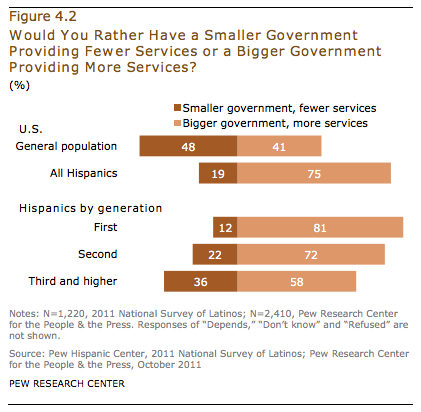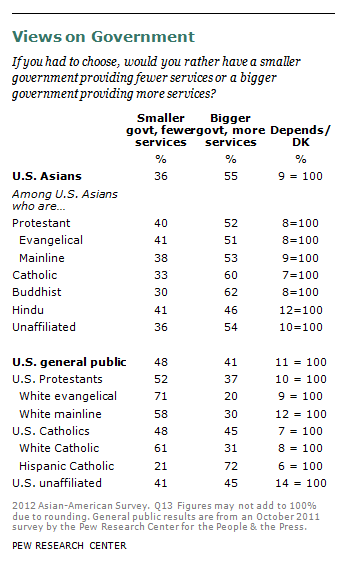I’ve blogged in the past about what I see as a potential turning point in the state of American libertarianism, and the ascendancy of a demographic committed to shrinking the scope of government to expand individual liberty. I think Obamacare’s abysmal failure has set back progressivism. In the New Republic, Noam Scheiber laments, “Liberal Democrats all but concede that Obamacare marked the end of their activist ambitions.” But I fear this is somewhat ephemeral. The longterm trend line in favor of bigger government, though it may peak and valley, is slanting upward. And powering that upward trend is a shift in changing demographics of America.
We can view this burgeoning demographic through two lens. First let’s consider how American dependence on big government can frustrate the rising tide of libertarianism. Regardless of the merits and demerits of Obamacare (and I’ve argued that there are many more of the latter than the former), the fact that millions of people now rely on Obamacare will entrench it. To reform the law would require taking something away from them.
In fact, apparently one of the “benefits” of Obamacare is to “reduce incentives” of people to work, and “liberate” people from their jobs. (I am hard-pressed to think of a more unlibertarian concept). Or remember Julia, the fictional character the Obama Administration created to show that every aspect of one’s life can be taken care of by our omnipotent platonic guardians in Washington. As more and more people view the government in this light–notwithstanding any “libertarian paranoia“–it will become more difficult to pare back and strive for more limited government.
This is a corollary of Mitt Romney’s infamous 47% comment (which turned out to be statistically accurate). As more people become dependent on the government, they will vote for the party that gives them more. Relatedly, the same people who rely on these benefits will be less likely to favor shrinking the scope of government, as it would make them worse off.
Second, we have to consider the changing demographics due to immigration. Let me state at the outset that the point of this post has nothing to do with immigration policy. I did some research to look at how the two most-prominent immigrant groups–Hispanics and Asians–skew with respect to views on big government. I find this a more helpful metric to discuss libertarianism than the normal liberal/conservative divide. Immigrants can skew socially conservative, but this says nothing about how they view limited government.
A 2012 Pew study on Hispanic Identity offers some fascinating insights.
Among the general population, 48% favor smaller government, while 40% favor larger government. However, among hispanics, only 19% favor smaller government, while 75% favor larger government. What is fascinating though is that these numbers change from generation to generation. For first generation Hispanic immigrants, the breakdown is 12/81. For second generation Hispanic immigrants, it is 22/72. And for third, and higher generation Hispanic immigrants, the breakdown is 36/58. This is still lower than the general population, but as Hispanics spend more time in America, they are more likely to favor small government. The study offers no explanation for this phenomenon, but this would seem to be relevant for analyzing the long-term viability of libertarianism. (I wish someone would study this question!).
A 2012 Pew Study among Asians, another significant immigrant group, show stronger support of bigger government than the general population–though not as wide of a gap as among Hispanics. 36% favor small government and 55% favor bigger government, as compared to the general societal breakdown of 48% who favor smaller government 40% who favor bigger government. The numbers are not broken down based on first, second, and third generation immigrants.
With great trepidation, I link to a report by Phyllis Schlafly’s Eagle Forum, summarized at NRO, breaking down these Pew polling numbers. (I stress that I do not endorse Schlafly’s conclusions, or any of her normative positions). Schlafly looks at the numbers I discussed above (which I think she took somewhat out of context, but whatever) as reasons why conservatives should oppose amnesty. Her argument, in short, is that admitting millions of new immigrants (mostly Hispanic) will skew the demographics towards those who favor larger government, and frustrate any prospects of a growing conservatism.
Schlafly’s views about opposing immigration changing a pre-existing culture is not limited to American conservatism. Even in a progressive nation like Norway, that has prided itself on a robust social welfare society, a massive influx of immigrants (mostly Muslim) has shifted the views of many natives. The Times reported on this topic last month:
Their concerns about immigration and perceptions that Islam is challenging prevailing national values are widely shared, both among some Norwegians, like the Ulvestrands, on the left of the political spectrum, and among many on the right, who in September put the Conservative Party into office after eight years of government by Labor Party-led leftist coalitions.
In a nation that has long prided itself on its liberal sensibilities, the intensifying debate about immigration and its effects on national identity and the country’s social welfare system has been jarring — and has been focused on the anti-immigration Progress Party, which is part of the new Conservative-led government.
Norway has the American conservative problem in reverse. They want to preserve their welfare system, and keep out the “others” who will now utilize it too much:
“We are strict on immigration, but this is not a war on cultures. Our idea is to protect our welfare system.”
Asked about national values, Mr. Solvik-Olsen instead spoke of the kind of discomfort that the Ulvestrands felt here. “Some people feel they’re waking up one morning and their old neighborhood is gone,” he said. “Strangers move in and peoplce don’t even understand what they’re saying; we have a generous welfare system, and you feel a stranger in your own neighborhood.”
Conservatives like Schlafly are opposed to allowing immigration because they will rely on the welfare state, and expand it, permanently.
Where does this leave libertarianism? Ideally, I would hope that libertarians could appeal to these groups–many who travelled from countries with less freedom–and highlight the values of individual liberty in the classical sense.Perhaps, naively, I would think that immigrants traveling from less-free countries would cherish the idea of individual liberty and freedom in the United States, as part of the American dream, and realizes the dangers big government poses. Though, if these numbers are to believed, that is not the case. This does not bode well to a growing, and sustainable libertarian voting bloc.
I don’t know where we go from here. So let’s assume we have two surging groups that are, implicitly at least, going to oppose libertarian policies. What is the answer? Should libertarians just call it a day? Or, should we acknowledge that we are fighting an uphill battle that we will eventually lose when those taking outnumber those producing? Should we just brace ourselves to become a European Democratic-Socialist nation? Or fight like hell at home, and abroad. Groups like Students for Liberty (of which I am an alumni and donor), have made great strides in outreach, and spreading notions of classical liberalism around the world.
I don’t know where to go from here, though, I’m sure that in my lifetime, these issues will come to the forefront, and challenge any broad movements for a smaller involvement of the government in all of our lives.
I offer these two vignettes as mere observations. I haven’t formed any conclusions on this topic yet, but it has preoccupied my mind of late.
Update: Related thoughts from Eugene Volokh and Ilya Somin here and here.

